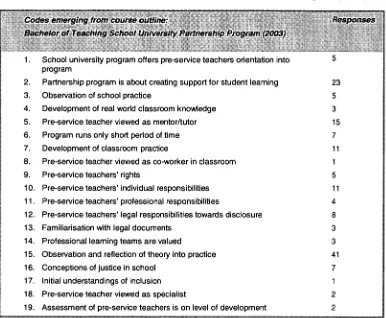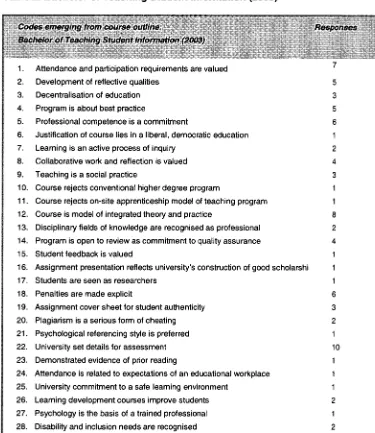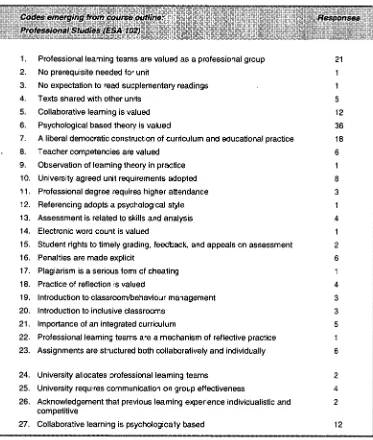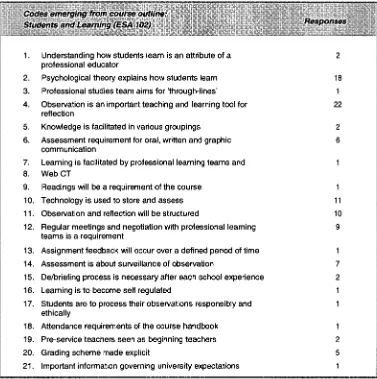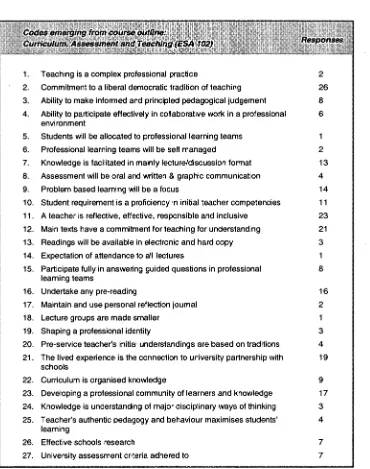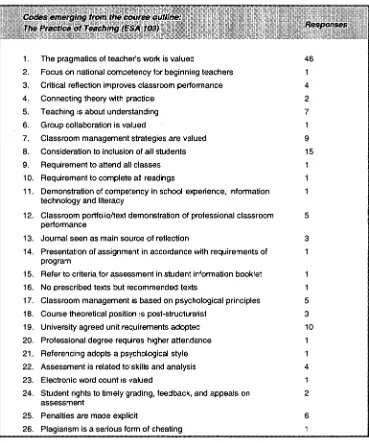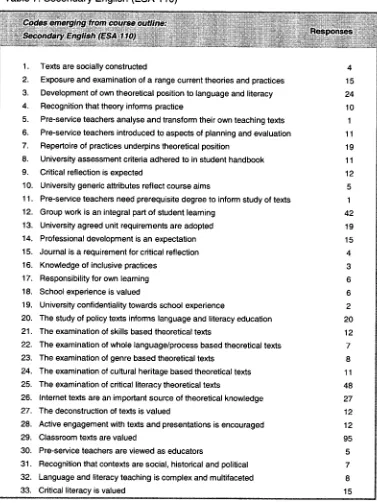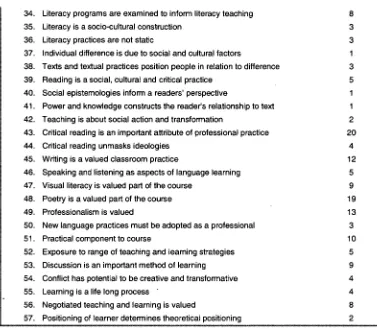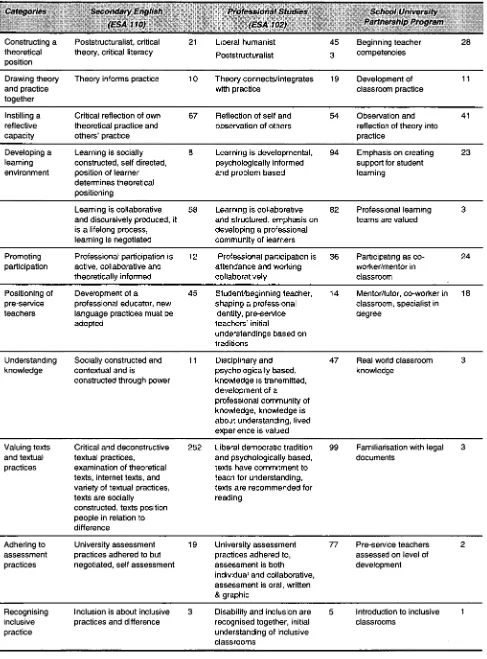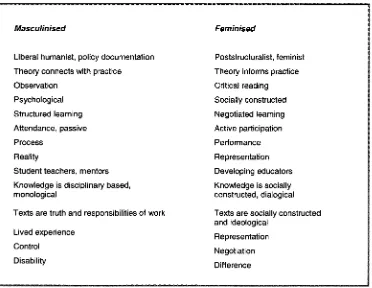English
Pre-service Teachers as
Bricoleurs
Sara Booth
Submitted in fulfilment of the requirements for the
Degree of Doctor of Philosophy
This thesis contains no material that has been accepted for a degree or diploma by
the University of Tasmania or any other institution, except by way of background
information and duly acknowledged in the thesis, and to the best of my knowledge
and belief contains no material previously published or written by another person
except where due acknowledgement is made in the text of the thesis, nor does the
thesis contain any material that infringes copyright.
Sara Booth
This thesis may be made available for consultation, loan and limited copying. This
permission covers only single copies made for study purposes subject to the normal
conditions of acknowledgement in accordance with the Copyright Act 1968.
<5)30Jc)r\i,
Sara Booth
This thesis investigates the discourses that were present in one teacher education
site in Tasmania over a two-year period. This involved both the investigation and
analysis of teacher education practices as well as pre-service teachers' responses to
such practices. The research is ethnographic, focusing in particular on the
discourses produced by Secondary English pre-service teachers in the construction
of their subjectivities.
This thesis draws from post-critical writing pedagogy, discourse analysis and
feminist poststructuralist theory, arguing that subjectivity is fragmented, multiple
and fractured rather than fixed and unitary. The research strongly argues that
teacher education practices of personalising experience through the use of the
genres of narrative, biography and autobiography constrain subjectivity.
Furthermore, researching the personal through teacher research and action research
'focuses on the research process rather than the writing process. This research
repositions the personal as a product of discourse, rather than personal experience,
by repositioning research as writing (Lee 1995/1996, 1998) and discourse analytic
techniques as significant in providing Secondary English pre-service teachers with
the semiotic space to reconstruct pedagogy.
The dominant discursive positions that were made known in relation to the
Secondary English pre-service teachers are identified using a grounded theory
approach and further elaborated using discourse analysis. The dominant discourses
of the teacher education site were also analysed in conjunction with the Secondary
English pre-service teachers as part of the emancipatory intention of the study. The
initial analysis of data from the first year of the study resulted in the
implementation of an interruptor strategy on subjectivity (McWilliam 1995),
through the process of research as writing (Lee 1995/1996, 1998), to displace
Secondary English pre-service teachers' initial, fixed assumptions of teaching. The
deconstructive process of double reading (Grosz 1989; Lather 1996, 2004) as well
as collaborative rewriting practices, worked towards displacing, repositioning and
in the process redesigning subjectivity and pedagogy. Reciprocity is positioned as
a critical and productive part of the study in the displacement and repositioning of
I would like to acknowledge my sincere gratitude and appreciation to my
supervisor, Dr Claire Hiller, for her patience, commitment, consideration and
support in the writing of this thesis. Our relationship has truly reflected an excellent
working example of a co-productive and professional partnership in teacher
education. Our shared commitment and passion in providing pre-service teachers
with the best in pedagogical practice and theory displaced the traditional binaries in
our relationship. Our differences were our strengths.
I would like to acknowledge the twenty-six pre-service teachers who played an
instrumental part in this study and from whom I learnt a great deal about my
pedagogy and research practice.
Declaration / i
Permission to Copy / ii Abstract / iii
Acknowledgements / iv
Tables and Figures / viii
CHAPTERS
Introduction
1.1 Overview of the thesis 1
1.2 Feminist and poststructuralist discourses 13
1.3 Bricoleurs and bricolage 18
1.4 Conclusion 21
2
Literature review 23Introduction 23
2.1 Research study: An overview 25
2.2 The reconceptualisation of literacy 28 2.3 Repositioning genre to reposition subjectivity 35 2.4 Problematising personal experience 38 2.5 Repositioning experience as discursive 41
2.6 Repositioning teacher education practices 47
2.7 Conclusion 52
3
Methodology 54Introduction 54
3.1 Positioning of the research 56
3.2 Methodological principles of the research 57 3.3 Identifying issues in teacher education 62
3.4 Research design 66
3.5 Methods of data collection 73
3.6 Methods of analysis 80
3.7 Issues of legitimation and measurement 86
Introduction 91
4.1 Multi-analytic approach 92
4.2 Constructivist grounded theory 93
4.3 Construction of discourses 113
4.4 Double reading of discourses 126
4.5 Conclusion 129
5
Making subjectivity visible 130Introduction 130
5.1 Analysis of the data 132
5.2 Significant events 140
5.3 Construction of discourses 142
5.4 Oppositional discourses 153
5.5 Conclusion 156
6
Part 1: Textual performance 158Introduction 158
6.1 Constructing semiotic space 159
6.2 Constructivist grounded theory 161
6.3 Five stages of the writing projects 162
6.4 Double visioning pedagogy 176
6.5 Conclusion 179
Part 2: Time as a discursive site of struggle 18 I
Introduction 181
6.6 Axial coding 182
6.7 Dimensional profile 183
6.8 Construction of discourses 198
6.9 Displacement of binaries 211
Introduction 216
7.1 Pluralist notions of literacy pedagogy 217 7.2 Discursive effects of teacher education 219
7.3 Re-designing pedagogy 224
7.4 Implications of the research 233
7.5 Conclusion 238
References / 240
Table 1 Bachelor of Teaching School University Partnership Program (2003) 96 Table 2 Bachelor of Teaching Student Information (2003) 97
Table 2 Professional Studies (ESA 102) 98
Table 4 Students and Learning (ESA) 102 99
Table 5 Curriculum, Assessment and Teaching (ESA 102) 101
Table 6 The Practice of Teaching (ESA 103) 102
Table 7 Secondary English (ESA 110) 104
Table 8 Dimensional profile of the Bachelor of Teaching course outlines 107 Table 9 Binary formulations of masculinized & feminised notions of gender 127 Table 10 Dimensional profile of Secondary English pre-service teachers 133
Table 11 Discourse of resistance 143
Table 12 Discourse of accommodation 146
Table 13 Discourse of pragmatism 149
Table 14 Discourse of limitations 151
Table 15 Stage one of writing projects 163
Table 16 Stage two of writing projects 164
Table 17 Stage three of writing projects 166
Table 18 Stage four of writing projects 170
Table 19 Stage five of writing projects 174
Table 20 Identifying the binaries of stage five of the writing projects 177 Table 21 Dimensional profile of second-year data 185 Table 22 Displacing binarisms in pre-service teachers' knowledge construction 212 Table 23 Discursive effects on pre-service teachers' subjectivities 220
Figure 1 Axes of power and distance 230
CHAPTER 1
Introduction
1.1 Overview of the thesis
1.1.1 The aims of the research
One of the pre-service teachers mentioned that she had an "oh haa moment" when she realised that as teachers you needed to have theory. I think the resistance and reluctance to having their own theory relates to their own learning, especially at university. They did not have to prescribe and take ownership of a theory, only discuss and critique theory. How can you translate this into the classroom? How can you assist pre-service teachers in developing their own theory? (Research Journal, 17 April 2003)
The research initially generated from observations of pre-service teachers in a
Middle School English classroom in one teacher education site in Tasmania. The
above extract is from the researcher's journal which recorded observations of
pre-service teachers in three university English classrooms to identify issues or themes
that were important to them. The 'A haa' moment that happened to this particular
pre-service teacher in her first month of a Bachelor of Teaching degree was the
realisation that as a teacher she needed to be informed by theory. It also provided
insight for the researcher in questioning how the research could assist pre-service
teachers in developing their own theoretical and pedagogical practice. The extract
also recognises that these pre-service teachers, who already have an undergraduate
degree, are not used to taking ownership of their practice.
These initial observations and realisations together with the researcher's own
experiences of the Bachelor of Teaching program provided the basis for the
research. The researcher's own experience of undertaking Honours had displaced
her initial assumptions of teaching and learning. A critical feature of this initial
Honours experience was the idea of providing this textual and representational
experience to other pre-service teachers in their reconstructions of pedagogy and
transformational experience together with the need 'to be of use' (Lather 1996,
1999) in literacy education and teacher education refined the research to focusing
on understanding Secondary English pre-service teachers' experiences in one
teacher education site. To understand these initial insights the research involved
both the investigation and analysis of teacher education practices as well as
Secondary English pre-service teachers' responses to such practices.
The specific site of this doctoral investigation is a Secondary English university
classroom in Tasmania. The research involved studying twenty-six pre-service
teachers in this classroom during their Bachelor of Teaching degree from March
2003 until November 2004. The twenty-six pre-service teachers came to the
Bachelor of Teaching degree with a previous degree — many of whom hold an Arts
degree. These pre-service teachers ranged in age from twenty-two to forty-seven.
About half of these pre-service teachers were in their late twenties or older and had
worked in other professions, such as journalism, English as a Second Language
teachers, social work and hospital administration.
The Bachelor of Teaching program in which these pre-service teachers enrolled is
an undergraduate program offering a two-year Bachelor of Teaching degree in
three specialisations: Primary School, Middle School and Secondary School
teaching. The program has curriculum and method classes as well as a professional
practice component based around the practice of teaching. The program also offers
four practicum experiences which range in duration and levels of competencies
over a two-year period. The initial aim of the research focused on understanding
how six pre-service teachers, two from each of the Primary, Middle School and
Secondary specialisations, gained and applied their knowledge of English/Literacy
teaching. Understanding how they gained and applied this pedagogical knowledge
involved the immersion of the researcher in each of these three different curriculum
areas as well as the pre-service teachers' courses in pedagogy and classroom
practice.
understanding how Secondary English pre-service teachers constructed their
subjectivities. This analysis of the data, which occurred simultaneously with the
collection of data, demonstrated how the conflicting and contradictory discourses
of one teacher education site positioned pre-service teachers.
The next stage of the research involved the researcher, in collaboration with the
senior lecturer of the Secondary English course, constructing the Secondary
English pre-service teachers' second year assessment tool. This assessment tool
focused on Secondary English pre-service teachers viewing research as writing
(Lee 1995/1996, 1998) and involved collaborative feedback and rewriting
practices. These writing projects also contained discourse analytic techniques
(Rowan 2001) that sought to displace the pre-service teachers' initial assumptions
of teaching and learning. These writing projects were constructed with the intention
of assisting the Secondary English pre-service teachers in moving from 'a
pedagogy of opposition' (Giroux 1983) to transforming their own subjectivities and
pedagogies. As Davies argues, 'The question becomes one of how resistance can be
best organised and staged through collective shifts in discourses, and through
positioning oneself differently in relation to those discourses' (1994, p.34).
1.1.2 An overview of the thesis
This thesis examines how Secondary English pre-service teachers construct their
subjectivities in one teacher education site. This involves an examination of the
multiple and contradictory discourses of one teacher education site and how these
discourses both construct and constrain subjectivity. The thesis also examines how
the writing projects, undertaken by the Secondary English pre-service teachers,
reposition their subjectivities and how this repositioning has direct implications for
students' literacy learning. The research investigates how the discourses of one
teacher education site either produce or reproduce pedagogical practice.
The thesis is located within poststructuralist and feminist frameworks that position
language as a representation of experience and acknowledge that people are
positioned in their reading and writing in relations of power. Experience is seen to
have meaning only through discursive systems of meaning, which in turn maintain
and contest social power through language (Rhedding-Jones 1995, p.481). This
thesis views pedagogy as text (Lather 1992a) and therefore views pre-service
teachers' reading and writing of their pedagogies as constructed in relations of
to "read" pedagogical practices and student behaviours' (Finders 1999, p.259). The
process of double visioning (Davies 1994) or double reading (Grosz 1989; Lather
1996, 2004) pedagogy is positioned as significant in this research by endeavouring
to make visible for pre-service teachers the powerful and contradictory discourses
they occupy in teacher education.
The double reading process (Grosz 1989; Lather 1996, 2004) draws from Derrida
(1976, 1997) the notion of deconstruction as significant in the displacement and
repositioning of subjectivity. Deconstruction is used to open up texts and textual
practices and, in this particular case, pedagogy, to multiple readings and
interpretations. The double reading process (Grosz 1989; Lather 1996, 2004)
involves three distinct stages. The first stage involves identifying the binaries and
oppositions that structure an argument. The second stage is about reversing or
displacing these negative terms with a positive term. The last stage is about the
displacement of the binary oppositions, which results in a less coercive
organisation of terms (Grosz, cited in Lather 2004, p.205).
The double reading process (Grosz 1989; Lather 1996, 2004) is used in three
particular ways within this thesis. Firstly, it is used as a conceptual framework for
the research design. The first year of the research seeks to understand the
oppositions and resistances within teacher education discourses and Secondary
English pre-service teachers' discursive experiences of these discourses on their
subjectivities. The second year of the research seeks to reverse and/or displace
these oppositions, which in turn will hopefully provide semiotic space for
pre-service teachers to reconstruct their subjectivities and pedagogies. This stage
involves the pre-service teachers learning to read their pedagogies 'against the
grain' (Cochran-Smith 1991, 2004; Cochran-Smith & Lytle 1993; Davies 1992; De
Lauretis 1987; Taylor 1995).
Secondly, the double reading process (Grosz 1989; Lather 1996, 2004) is further
enacted as a displacement strategy on the Secondary English pre-service teachers'
subjectivities by the implementation of the writing projects, which considers
research as writing (Lee 1995/1996, 1998). This thesis aims to use the structural
and linguistic features of the research text both as a genre and as a writing process
to displace subjectivity. The research text represents a way of making visible the
A critical point in choosing the research text and its writing process is the ordering
and reordering of the chapters as well as the rewriting (Lee 1995/1996). This genre,
rather than the traditional personalised genres of narrative — biography and
autobiography — positions writing as 'assembling according to designs' (Kress
2003, p.6). Research as writing (Lee 1995/1996, 1998) is seen as not only a site for
the production and design of subjectivity but also, through the use of
poststructuralist theory (Davies 1994; Foucault 1980; Kamler 2001; Kress 1985;
Rowan 2001; Weedon 1987, 1997), as a site of intervention on subjectivity (Lee &
Boud 2003; Threadgold 1993).
The writing projects, through research as writing (Lee 1995/1996, 1998) as an
intervention strategy, also seek to displace and reposition pre-service teachers'
subjectivities through the utilisation of collaborative and explicit feedback and
discourse analytic techniques (Rowan 2001). Lastly, the double reading process
(Grosz 1989; Lather 1996, 2004) or double visioning process (Davies 1994) is
applied to the data in the analysis stage of the research with the aim of interrupting
the researcher's own readings of the data. This last stage recognises that to put data
into categories 'is an act of power' (Lather 1991a, p.125).
This thesis positions double visioning or double reading practices (Davies 1994;
Grosz 1989; Lather 1996, 2004) as central to interrupting and repositioning
pre-service teachers' initial assumptions of teaching. The words interruption and
disruption are applied and read in different ways within the thesis. These multiple
readings, both in the data and in the thesis, depend on how pre-service teachers are
positioned in reading certain discourses (Kress 1985). The process of double
visioning both 'within and against' (Lather 1991a, 1991b) teacher education
discourses is considered critical in seeking to provide alternative spaces for
pre-service teachers to re-design and reconstruct subjectivity and pedagogy. The term
'within and against' is about both 'doing' practice and 'troubling' practice
simultaneously (Lather 2001). This thesis aims to provide Secondary English
pre-service teachers with both these practices. It suggests that discourses that are
positioned in 'being done to' rather than 'doing' practices position pre-service
teachers as passive, controlled subjects of discourse rather than authors of their
own pedagogies and subjectivities (Lee 1993).
By double visioning (Davies 1994) or double reading practice (Grosz 1989; Lather
(Lather 1995) pre-service teachers' initial readings and assumptions of teaching.
The analysis of discourses produced in the research suggests that when pre-service
teachers reproduce — rather than actively provide — productive accounts of
pedagogical practice they are dislocated from establishing authority and ownership
of their pedagogies and position students inequitably in the classroom. Another
discursive effect of not being able to double vision (Davies 1994) pedagogy is that
these pre-service teachers stay positioned as students because they cannot recognise
their experience of being within and constituted by the master discourses (Davies
1994; Luke & Gore 1992).
This thesis is informed by critical pedagogy in the way that it seeks to offer agency,
critical consciousness and critical subjectivity (Lankshear 1994; Lather 1996,
1997). These three terms will be discussed separately in relation to the research.
Firstly, agency is defined as 'the power that mobilises existing discourses in new
ways, inverting, inventing and breaking old patterns' (Davies 1991, p.51). In
relation to the research, through the implementation of the writing projects, this is
about offering pre-service teachers a way of inventing and producing their
pedagogical practices.
Secondly, critical consciousness is seen to have four central qualities: an awareness
of how power is exercised in society; an awareness of being able to critically
analyse texts for ideological meanings; an awareness of being able to recognise and
challenge these social and political values and lastly an awareness to take the
initiative and transform school and society from undemocratic and unequal
distributions of power (Shor, cited in Lankshear 1994, p.22). This thesis seeks to
use the writing projects to assist the Secondary English pre-service teachers in
becoming critically aware of their own actions in being a teacher. Lastly, critical
subjectivity is seen to be produced by double practice (Lather 1997, p.239). This is
about providing pre-service teachers with a way of deconstructing their
subjectivities.
Acknowledging that critical pedagogy has been criticised as another successor
regime (Lather 1996), it still provides important implications for critiquing
pedagogy and emphasising the importance of agency. This thesis positions critical
pedagogy as central to 'interrupting particular historically situated systems of
oppression' (Lather 1992a, p.121). Pre-service teachers have been traditionally
resistance to reflect and to take up new pedagogical practices. Repositioning and
interrupting pre-service teachers' initial assumptions of teaching involves a
repositioning of the traditional binary categories of teacher education and literacy
education. These traditional binary categories relate not only to the biological
notions of male and female but are also 'metaphors of generalised relations
between "doing" and "being done to" (Lee 1993, p.248).
This thesis suggests that positioning pre-service teachers in 'being done to'
categories can constrain subjectivity and produce binary categories (Lee 1993).
Some of the binary categories displaced in this thesis are: research as writing rather
than as a research process; the writing process as co-productive and collaborative
rather than individual; the personal as discursive rather than lived experience;
supervision as collaboration rather than control; knowledge as collaboratively
produced rather than individually transmitted and gender as socially constructed
rather than biological.
This thesis seeks to develop a critical discourse that provides a theoretical basis for
alternative approaches to the teaching of literacy pedagogy which also works
towards restructuring teacher education practices. It problematises teacher
education practices of researching and investigating the personal through the
teaching of the genres of narrative, biography and autobiography and action
research. It aims to challenge experiences based on personal, lived experience and
to suggest new ways of establishing teacher education practices that focus on
collaborative, discursive and productive practices.
1.1.3 Justification of the research
This thesis argues that the university is being displaced as the primary site for the
production of knowledge (Lee, Green & Brennan 2000), which has consequences
for the hierarchical positioning of the dominant discourses in teacher education and
in the construction of subjectivity of pre-service teachers. This thesis argues for the
repositioning of the traditional discourses of teacher education to reposition
subjectivity and pedagogical practice to meet the demands of societal change and to
provide alternative spaces in the construction of subjectivity of pre-service
teachers. The justification for this research is that repositioning pedagogy to cater
for new theories of representation demands a displacement and restructuring of the
traditional binary categories of teacher education practices, such as the
Teacher education has traditionally focused on the specific genres of narrative,
biography, autobiography and life history as textual practices which encourage the
personal and responsive in the examination of pre-service teachers' initial
assumptions of teaching to reposition pedagogy. This thesis argues that these
particular genres naturalise particular ways of thinking and result in the personal
being largely untheorised, constrained and unread (Finders 1999; Kamler 2001). In
effect, these traditional categories of thought need destabilisation (Lather 1995).
Destabilising these traditional binary categories of thought involves pre-service
teachers learning to work both within/against teacher education discourses (Lather
1991a, 1991b).
This thesis views all writing as personal (Kamler 2001) and therefore positions
research as writing (Lee 1995/1996, 1998) as an alternative to repositioning the
personal. The structure of the research text and the genres of argument, report and
exposition which are mainly utilised in research all work to reposition English
pre-service teachers' subjectivities and pedagogies. Genre, however, cannot alone
reposition pre-service teachers' subjectivities as it has its basis in linguistics, does
not provide a theory of discourse, and therefore constrains subjectivity (Kamler
2001; Lee 1997). This thesis suggests that repositioning English pre-service
teachers' subjectivities also involves feminist, poststructuralist strategies to
problematise the personal by opening up alternative spaces to reconstruct
subjectivity and pedagogy.
This thesis argues that constructions of literacy and literacy pedagogy that have
singular, fixed notions of practice are presently being displaced by pluralist and
productive notions of practice as a result of societal and technological change.
Pre-service teachers, specialising in literacy and literacy pedagogy, need to displace
and reposition their initial, fixed, singular notions of literacy into more flexible,
productive repertoires of pedagogical practice. Productive pedagogical practices
infer notions of agency and desire. This thesis strongly argues that teacher
education institutions through their discourses constrain pre-service teachers from
reconstructing subjectivity and pedagogy (Gore 2002; McWilliam 1993, 1995).
These discourses have the discursive effect of producing a discourse of needs
rather than one of desire and agency in pre-service teachers in their constructions
have the discursive effect of positioning pre-service teachers in reproductive rather
than productive practices.
This thesis situates agency as significant in changing pre-service teachers' initial
assumptions of teaching by changing reproductive, singular, fixed notions of
literacy practice into pluralist, productive and interactive practices. The term
re-design rather than rere-design, which is similar to Taylor's use of re-production, is
positioned as significant in this thesis to 'emphasis agency in the social processes
involved, and therefore the potential to change' (1995, p.5). When pre-service
teachers do not relocate or re-design their pedagogical practices into more
productive and interactive notions of literacy practice, they remain situated in the
very traditions that they hoped to change (Britzman 1991). Transforming
pre-service teachers' literacy pedagogies is about transforming and changing current
teacher education practices into more productive, interactive and collaborative
forms of pedagogical practice.
In relation to pre-service teachers it is critical that they are made makers and critics
of pedagogy rather than just consumers (Kamler 2001). Pre-service teachers need
to be able to invent and design new pedagogical practices rather than reproduce
pedagogical practice. School students are presently being repositioned as 'learner,
transformer/maker' (Kress 2002, p.134). The shift in the way society
communicates also has the effect of producing interactivity which is about the user
being able to 'write back' to the producer of a text as well as permitting the user to
enter into associations with other texts (Kress 2003, p.5). This has implications for
changing teacher education practices from teacher-centred, reproductive practices
into student-centred, collaborative, interactive and productive practices. Displacing
fixed assumptions of teaching in pre-service teachers thinking is about displacing
the traditional binary categories in teacher education and literacy education by
placing more emphasis on theories of learning rather than theories of teaching. This
thesis argues that with new theories of meaning comes a reconceptualisation of
practices in teacher education and literacy education, which positions collaborative
and co-productive practices rather than supervisory practices as central in the
remaking and re-designing of subjectivity.
1996). With the advent of technology and its associated practices, this is changing
the very nature of how texts and textual practices are constructed, produced and
read. Texts, as a product of social interaction, are positioned as central to the way
people interact and live in society (Kress 1996a).
The central positioning of texts in society, therefore, demands a critical awareness
of discourse and how discourses constitute subjectivity and position people.
Theories of representation rather than theories of stabilisation have been
repositioned as a critical resource for people to examine their place in this
technologically dominated society (Fairclough 2004). As a consequence, literacy
and literacy practices of teacher education need to reposition their pedagogical
practices to cater for the significant role texts and discourse play in the construction
of a multiliterate society.
1.1.4 Theoretical location
The research investigates issues of literacy, literacy pedagogy and teacher
education that are connected to the sites of post-critical writing pedagogy, feminist
theory and discourse analysis. In investigating these issues the research engages
theories of discourse and subjectivity from within poststructuralism, with particular
attention to Foucault's work (1980, 1988), to demystify the power of discourse in
order to better understand the discursive practices that construct our sense of self,
other and reality. These theoretical sites contribute to the idea that practice, and in
this case literacy practice, is a legitimate site of educational reform (Brodkey
1996). Brodkey comments that, 'Teachers who can identify, describe, analyse
discursive formations ... are even better positioned to reconceptualise education if
their plans for reform also entail a critique of the discursive practices that impede
teaching and learning' (1996, p.17).
This thesis argues that teacher education and its associated curriculum practices are
responsible for providing productive accounts of literacy pedagogy for pre-service
teachers. These productive forms of social organisation are essential in providing
school students with the necessary representational resources to operate in this
increasingly dominant discourse and text based society (Freebody & Luke 2003;
Kress 1996b). School students need to be provided with the cultural, linguistic and
This thesis provides an alternative form of social organisation, which draws from
academic literacy and doctoral research education, so that pre-service teachers can
produce a productive textual analysis of their own texts and textual practices. The
curriculum is, therefore, seen as 'a design for a future social subject, and via that
envisioned subject a design for a future society' (Kress 1996b, p.16).
Representational resources such as textual analysis (Rowan 2001) in association
with co-productive relationships, necessitates productivity so that as future literacy
educators, pre-service teachers can provide students with the resources to
productively change and transform their own personal, cultural, social and
economic practices.
1.1.5 Methods of data collection and analysis
The research is informed by ethnographic, qualitative and discourse analytic theory
(Britzman 2000; Fairclough 2001; Knobel & Lankshear 1999; Lee 2000; Taylor
2001). It is ethnographic with the researcher acting as participant observer in a
Secondary English university classroom over a period of two years from the
beginning of 2003. A journal is kept by the researcher during this time to represent
'the cultural knowledge working in a particular place and time as it is lived through
the subjectivities of its inhabitants' (Britzman 2000, p.27). Ethnography is not seen
as raw data but as a beginning in the deconstruction of pre-service teachers'
subjectivities (Rhedding-Jones 1995, p.486).
During this time the researcher developed a close familiarity with the pre-service
teachers because of the extent of time spent as a participant observer in their
classroom. The second year of the research coincided with the implementation of
the writing projects as part of the methods of data collection. These writing projects
included collaborative feedback by both the senior lecturer and the researcher,
which changed the nature of the relationships with these pre-service teachers.
These relationships became more interactive, dialogic, supportive and reciprocal as
a result of the feedback given through the writing projects.
A qualitative research approach was adopted because of its focus on constructing
collaborative and participatory projects that deal directly with people's lives
(Cohen, Manion & Morrison 2000; Lincoln & Denzin 2000). A qualitative
approach is used also because it 'constructs a picture that draws from, reassembles,
and renders subjects' lives' (Charmaz 2000, p.522). This research attempts to
of each chapter and through the analysis chapters. This does not diminish the
researcher's responsibility and privileged position in the research, but it does
recognise the researcher's efforts in trying to speak with and about the participants
rather than for them (Bloom 1998, p.12). As well as positioning itself in a
qualitative tradition, the thesis also situates itself within postpositivist discourses.
Postpositivist research discourses provide 'an alternative means of articulating the
relationship between research and pedagogy' (McWilliam 1995, p.58).
The researcher's subject position informs a constructivist grounded theory
approach and the coding process initially used to interrogate and interpret the data
and the readings of the discourses produced. Constructivist grounded theory in
conjunction with ethnography offers the research 'an open ended approach to
studying the empirical world yet adds rigor to ethnographic research by building
systematic checks into both the data collection and analysis' (Charmaz & Mitchell
2002, p.162). This research employs constructivist grounded theory because it
offers a set of flexible strategies that can be used with varied forms of data
collection methods (Charmaz 2000, 0.513-514). Data is treated as reconstructions
of experience rather than as truth (Charmaz 2000). This research aims to position
one of the data collection methods, the writing projects, not only as a technique for
gathering data but also as an interruptor strategy (Harding 1987; McWilliam 1995)
on the Secondary English pre-service teachers' subjectivities.
This research also applies a discourse analysis to the Bachelor of Teaching program
through an examination of its course outlines, qualitative surveys, informal
interviews, email correspondence, research journal, with a focus on the writing
projects written by the Secondary English pre-service teachers and reworked
co-productively with the senior lecturer of the Secondary English classes and the
researcher. Discourse analysis has been chosen because it seeks to understand how
language and power both construct and constrain the Secondary English pre-service
teachers' subjectivities. Discourse analysis is positioned within this thesis as social
action (Luke 1997). Equally important to the research is the implementation of
discourse analytic techniques (Rowan 2001) within the writing projects, which
aims to displace pre-service teachers' initial assumptions of teaching.
1.1.6 Research relationships
In making explicit the close relationships built with the research participants it is
Secondary English course and the researcher. This close collaborative relationship
initially developed when the senior lecturer was the researcher's Honours
supervisor a year before the research began. This initial Honour's supervisory
relationship developed into a doctoral supervisory relationship in which the
researcher became positioned as researcher within her supervisor's classroom, with
the pre-service teachers being the subject of her research. This involved the notion
of 'researching up', that is, 'conducting research in an elite setting with respondents
who have more power and status than the researcher' (Bloom 1998, p37). This
acknowledges issues of unequal power involved in such relationships.
Whilst this unequal positioning did produce a vulnerability and tension during the
research, it also had the effect of making conscious the process of diminishing the
way researchers manifest power (Bloom 1998). The similarity between both the
researcher and her supervisor was a shared commitment to the discourse of
feminism that acknowledges that power cannot be eliminated in research
relationships; however, it is the commitment to understand how power can position
people in their interactions with each other (Bloom 1998).
This research also makes visible the renegotiation of power relationships, which
challenges the initial assumptions of teaching and learning, and includes 'Questions
about "who teaches", and "who learns" as well as "what is taught" and "what is
learned" had to be renegotiated' (Hollingsworth 1994, p.5). The researcher, as well
as her supervisor, the senior lecturer, had to renegotiate and reposition power in
their relationship on a continual basis during the research. The reposturing of
authority (McWilliam 1997) produced a reciprocal relationship in which 'Each
looks at the other, and sees themselves differently' (Green 2005, p.154).
1.2 Feminist and poststructuralist discourses
1.2.1 Positioning the research
This research is situated at the intersection of post-critical writing pedagogy,
feminist theory and discourse analysis. It is an examination of the repositioning of
the Secondary English pre-service teachers in one teacher education site from
within a poststructuralist feminist framework in order to raise questions about the
construction and constraint of subjectivity in relation to the powerful discourses of
replace them with a different agenda which involves the empowerment and voice
of pre-service teachers (Cohen, Manion & Morrison 2000).
Poststructuralist theory seeks to find ways in which everyone is constituted and
envisage new ways of moving beyond these constructions. It also seeks to make
visible the multiple and contradictory discourses in which everyone is inevitably
caught up and in the process develop an awareness of the limitations and powerful
entrapments entailed in these categories (Davies 1994). Poststructuralist theory is
used within the research to put under erasure (Derrida 1976) the binary categories
in pre-service teachers' thinking so that they can reconstruct and take ownership of
their pedagogies.
Poststructuralist feminist theory offers pre-service teachers 'a different way of
seeing' which enables them to position themselves differently (Davies 1994, p.26).
The analysis of the discourses in this thesis suggests that when pre-service teachers
do not position themselves differently they stay entrapped in the discourses of
-accommodation, resistance and disenfranchisement. This entrapment has the effect
of positioning both pre-service teachers and students alike in inequitable and
resistant relationships.
As this thesis is positioned within feminist discourses it also addresses the feminist
concept of invisibility (Lather 1995) of pre-service teachers' subject positions in
teacher education and the distortion of their experience as real rather than as
representational and textual. The thesis considers pre-service teachers' needs as
legitimate responses to the relations of power/knowledge available to them
(McWilliam 1993). The research seeks to change and reposition pre-service
teachers' needs into desire. Desire is equated with ownership and is transferred
through intense, collaborative relationships (Green 2005). Desire is positioned in
this thesis as both positive and productive (Lee & Boud 2003) as it plays a vital
role in constructing new forms of self in pre-service teachers.
1.2.2 Language
This thesis, which is about the transformation and change of Secondary English
pre-service teachers' subjectivities and pedagogies, views the means of
representation as fundamental. A view of language as fixed and inflexible and
based on norms has normative consequences (Freebody & Baker 2003); whereas a
productive and interactive capacities (Kress 1996a, 2002, 2003). Language,
therefore, is positioned in this thesis as 'the constant, dynamic remaking of existing
resources of representation' (Kress 1996a, p.66).
Language is also positioned in this thesis as a product of social and cultural
practices (Kress 1996a). For it is through language that subjectivity is constructed
and constituted (Weedon 1987). Drawing from Saussure, language constitutes
social reality and produces social meanings (Weedon 1987). Weedon (1987) argues
that,
Social meanings are produced within social institutions and practices in which individuals, who are shaped by these institutions, are agents of change, rather than its authors, change which may either serve hegemonic interests or challenge existing power relations. (p.25)
This research seeks to change and transform the Secondary English pre-service
teachers, from being agents of change, into authors of their own subjectivities and
pedagogies which in turn brings about agency. The research seeks to reposition
these pre-service teachers as 'authors of one's own multiple meanings and desires'
(Rhedding-Jones 1995, p.481).
1.2.3 Language as discourse
This thesis uses the concept of discourse to explain how power works through
certain vested interests. The analysis of dominant discourses, through the study of
language in this particular research site, provides opportunities for analysing
resistance to the powerful vested interests in teacher education. Two definitions of
discourse are used within this research to understand this resistance. The first of
these definitions relates more to the macro level of analysis in this research, which
focuses on the values and practices of an institution — in this case, a teacher
education site. The second definition relates more to the micro level of analysis in
the research which focuses on the way the Secondary English pre-service teachers
are positioned by the powerful discourses of teacher education.
The first definition of discourse relates more specifically to the powerful vested
interests in teacher education and how these discourses discursively position the
Secondary English pre-service teachers. This definition of discourse relates to
'systematically-organised sets of statements, which give expression to the
emphasises the controlling aspects of discourse (Davies 1994). Discourse analysis,
therefore, becomes not only a method of analysis in the research but it is also
positioned as social action (Luke 1997). The research seeks to change the
discursive boundaries of the order of discourse (Fairclough 2001) so that
Secondary English pre-service teachers can reconstruct and reposition subjectivity
and pedagogy.
The second definition, which is based in poststructuralist feminist theory, focuses
on 'a theory which decentres the rational, self-present subject of humanism, seeing
subjectivity and consciousness, as socially produced in language, as a site of
struggle and potential change' (Weedon 1987, p.41). Weedon's definition relates
explicitly to the discursive struggle that the Secondary English pre-service teachers
undergo in their learning to become a teacher and emphasises the effect on the
actual person (Davies 1994). By viewing language as discourse, this research
positions resistance or discursive struggle as a revealing function (Giroux 1983).
Discursive struggle is viewed as an opportunity to understand how the research
participants seek to protect their interests from the dominant discourses of this
particular teacher education site. As Weedon (1987) argues,
Resistance to the dominant at the level of the individual subject is the first stage in the production of alternative forms of knowledge production or where such alternatives already exist, of winning individuals over to these discourses and gradually increasing their social power. (p.1 1 1)
1.2.4 Subjectivity and agency
Subjectivity is positioned within this thesis as fragmented, multiple and fractured
rather than as fixed and unitary. The production of subjectivity is the result of the
constitutive force of discourse (Green 2005). An individual's subjectivity is
constructed and constituted through the multiple discourses that they encounter in
their lives rather than solely through lived experience (Davies 1994). This thesis
seeks to retheorise the subjectivities of the Secondary English pre-service teachers
by displacing their initial, fixed assumptions of teaching. This displacement
involves working both within/against teacher education discourses (Lather 1991a,
199 lb). The idea is that by displacing subjectivity, it can be reconceptualised and
reconstructed and, as a result, reposition and improve student learning. Displacing
reconceptualisation of agency from subject-centred agency to the plurality and
agency of meaning' (Lather 1991a, p.120).
This thesis argues that the transformation or remaking of subjectivity is tied to
notions of production and productive relationships. The emphasis on
co-productive relationships relates to how meaning-making has become a social rather
than an individual practice as a result of changes in technology (Kress 2002). This
thesis considers reciprocity through co-productive relationships as necessary in the
construction of subjectivity of future subjects. Reciprocity, through the rewriting
and feedback practices employed in conjunction with the writing projects, aims to
work as an intervention on subjectivity. As Butler (2001) argues,
I do not think theory is sufficient for social and political transformation. Something besides theorising must take place: interventions at social and political levels which involve actions, sustained labour, and institutionalised practice ... (p. 1)
Reciprocity is positioned as a critical and ethical imperative in the construction of
subjectivity within this thesis. The construction of Secondary English pre-service
teachers' subjectivities is viewed as a process of social negotiation (Green 2005;
Lee 1998; Lee & Boud 2003).
1.2.5 Power
Power is recognised in this thesis as being 'exercised within discourses in the ways
in which they constitute and govern individual subjects' (Weedon 1987, p.113).
Drawing from Foucault, power is seen as both productive and repressive (1980,
p.59). This thesis seeks to understand the effects of both the macro and micro levels
of power (Foucault 1980) in one teacher education site on the Secondary English
pre-service teachers' subjectivities and pedagogies. It also seeks to change the
techniques of power (Foucault 1980; Gore 2002), through the implementation of
the writing projects, to reposition subjectivity and pedagogy.
1.2.6 Positioning
Rather than colonising or imposing on pre-service teachers' subject positions, this
thesis works to enable pre-service teachers to position and reconstruct themselves
differently in relation to the existing discourses of teacher education (Davies 1994).
This thesis recognises that it is the power of the dominant discourses in teacher
positions (Davies & Banks 1995). Teacher education institutions, not unlike
schools, situate pre-service teachers in a number of conflicting and contradictory
subject positions, such as student/teacher/pre-service teacher. These different
subject positions result in pre-service teachers, not unlike the subject position of
'good reader' or 'slow reader' (Davies 1994), being positioned in either productive
or reproductive practices in literacy pedagogy.
1.2.7 Gender
This thesis considers gender socially constructed and discursively constituted
(Bloom 1998; Davies 1994). In particular, this thesis recognises the way gender is
discursively constituted through the genres of narrative, biography and
autobiography. Experience seen as lived experience makes power problematic for
those positioned as female or as invisible as in the case of the pre-service teachers.
This thesis seeks to make problematic the gendered storylines that these genres
construct through double visioning pedagogy (Davies 1994). Gender is seen as a
critical category which needs to be displaced as it can lead to the contribution and
circulation of gender norms (Rowan et al. 2002).
1.3 Bricoleurs and bricolage
1.3.1 Repositioning pre-service teachers as bricoleurs
As the title of the thesis suggests, the object of this research is about repositioning
Secondary English pre-service teachers' subjectivities and pedagogies. This
research also seeks to reposition pre-service teachers as bricoleurs in their
constructions of pedagogy. The term bricoleur refers to someone who invents,
remakes, reconstructs and most importantly transforms meaning through their work
and their work practices (Honan 2004; Lather 1991a; Lincoln & Denzin 2000). In
relation to literacy and literacy pedagogy, English pre-service teachers are being
positioned as designers in this era of instability (Kamler & Comber 2003/2004;
Kress 2000, 2002, 2003). This thesis views the design and re-design of subjectivity
as significant in the reconceptualisation of literacy and literacy practices in the
twenty-first century, where individuals are positioned not as users but as
transformers (Kress 2002).
This thesis utilises the terms bricoleur and bricolage to position the research in
to the idea of displacement which Barthes (quoted in Moi 1986) in his writing of
Kristeva writes,
And now I have been made to feel again ... the force of her work. Force here means displacement. Julie Kristeva changes the order of things: she always destroys the latest preconception, the one we thought we could be comforted by, the one of which we could be proud; what she displaces is the already-said ... (p.1)
This thesis perceives all texts, including the research text, as bricolage, that is,
'oblique collage(s) of juxtapositions' (Lather 1991a, p.10). Words such as collage,
bricolage, montage, mosaic and pastiche point to the borrowing of ideas which
positions the meaning-maker as an artist or a designer (Kress 2000, 2002; Lather
1991a; Ross Johnson 2002). The various subject positions within texts all in some
way 'deliberately [create] disorder by unsettling the audience' (Dinan, cited in Ross
Johnson 2002, p.314).
The term bricolage is carried further in the thesis by the borrowing of ideas across
three main theoretical sites: post-critical writing pedagogy, feminist theory and
discourse analysis. These particular theoretical sites contribute to the idea of
boundary crossing (Bull & Anstey 2002; Cartwright, Gervasoni & Nuttal 2001;
Giroux 1992; Kamler 2001; Ross Johnson 2002) and to the construction of a
border pedagogy (Giroux 1992). A border pedagogy involves the process of
rewriting subjectivity by crossing over into cultural borders that offer 'a resource
for rethinking the relationship between the centre and the margins of power as well
as between themselves and others' (Giroux 1992, p.174).
Boundary crossing, furthermore involves a reconceptualisation of ideas and
thinking so as to open up other possibilities and opportunities to improve practice.
Ross Johnson (2002) in her discussion of boundary crossing in arts and education
gives the example of engineers constructing a bridge for crossing
... a wide thoroughfare that has traffic going both ways. One means of facilitating the construction of this bridge is to conceptualise a little differently the role of key figures in the drama that is playing out around its environs: that is, in terms of children's literature, the roles of writer/illustrator, teacher and researcher. This conceptualisation does not so much change these distinctive roles as redescribe their distinctiveness in terms of a common denominator. (p.312)
Boundary crossing in this thesis assists in the reconceptualisation of pedagogical
writing projects, furthermore, works to position pre-service teachers as boundary
riders by `toing-and-froing' (Ross Johnson 2002, p.311) between the discourses of
the university and the discourses of school. By becoming boundary riders,
pre-service teachers are able to reconstruct new pedagogical borders 'where difference
becomes the intersection of new forms of culture and identity' (Giroux 1992,
p.174).
1.3.2 Genre as design on pedagogy
This thesis positions the remaking or rewriting of genre through collaborative
feedback strategies as significant in the repositioning and redesign of pedagogy
(Kress 1996a, 1996b, 2000, 2002, 2003; Saunders et al. 1999). Pedagogy is defined
within this thesis as 'the transformation of consciousness that takes place in the
intersection of three agencies — the teacher, the learner and the knowledge they
together produce' (Lusted, cited in Lather 1992a, p.121). The writing projects, in
conjunction with collaborative feedback, aims to provide the Secondary English
pre-service teachers with the capacities to remake or redesign pedagogy. This thesis
positions revision and rewriting as central in the remaking of signs and the self in
pre-service teachers' literacy pedagogies (Kamler 1997, 2001; Kress 1996b, 2003).
This thesis does not, however, endorse genres which construct the personal as
referential rather than representational. Pre-service teachers need to be able to read
their pedagogical practices textually rather than naturalise particular ways of
thinking and seeing (Finders 1999). This thesis positions genre as a significant
interpretative and representational resource in repositioning the subjectivities and
pedagogies of the pre-service teachers. It is about positioning genre as performance
rather than as reproduction. Performances involve rehearsals, which, in turn,
involve 'remaking the text, rewriting it from a multitude of different perspectives'
(Threadgold 1993, p.3).
As this thesis positions writing, in particular research as writing (Lee 1995/1996,
1998) as an interruptor strategy on subjectivity (McWilliam 1995), it recognises
that relatively little work has been done in the area of writing pedagogies especially
in the context of teacher education, other than in academic literacy and doctoral
research education. Noted exceptions are the work of Lee (1995/1996, 1998),
Kamler (2001) and Kamler and Comber (2003/2004), which relocate research as
writing (Lee 1995/1996, 1998) and reposition pre-service teachers as designers of
This thesis examines discourse and textuality in a way not previously done before
in educational research. By considering writing as text, this allows 'an object which
we could ask questions of and interact with critically' (Kamler 2001, pp.59-60).
Notable exceptions are Lee (1997), Kamler (2001) and Kress (1996b, 2003).
Writing is considered within this thesis as both a process and a social practice (Lee
1998). Writing is both a process in making (Lee 2000, p.201) as well as a process
of remaking or (trans) formation (Kress 1996b, p.66). Kress goes further and
argues that writing is also becoming 'assembling according to designs' (2003, p.6).
Making/remaking and design/redesign is equated to performance. Performance is
understood within this thesis as relating to different performances of the self
(Kamler 1997). Both writing and rewriting is seen as a performance of the body
which has certain performative effects (Lee 2000; Threadgold 2000). The twin
processes of writing/rewriting works to both position and reposition the different
performances of the self.
• 1.4 Conclusion
This chapter has sought to position the thesis in relation to the object of the
research, which is about the repositioning of Secondary English pre-service
teachers' subjectivities and pedagogies in one teacher education site. This chapter
has been about positioning the reader towards understanding the theoretical and
methodological underpinnings and justification for this doctoral investigation. The
following six chapters each work towards addressing the feminist concept of
invisibility (Lather 1995) of the Secondary English pre-service teachers' subject
positions in one teacher education site. By making transparent their experiences as
representational, textual and discursive rather than as real — based on lived
experience — we provide possibilities for agency and transformation.
Chapter Two positions the research through a review of the literature surrounding
teacher education and literacy education. It argues for a repositioning of genre and
teacher education practices to reposition pre-service teachers' subjectivities and
pedagogies. Chapter Three provides a detailed overview of the methods and
methodological principles employed in the research. Chapter Four utilises
constructivist grounded theory and discourse analytic methods to understand the
dominant discourses in one teacher education site. Chapter Five makes visible the
service teachers in the first year of their Bachelor of Teaching degree and the
discursive effects of the dominant discourses on their subjectivities and
pedagogies. Chapter Six, which is the focus of this liberatory research, is divided
into two parts. Part One describes the textual performances of the Secondary
English pre-service teachers through the five stages of the writing projects. Part
Two positions time as a discursive site of struggle (Britzman 2000) for the
Secondary English pre-service teachers, which works towards making transparent
the displacement of their initial assumptions of teaching and learning. Chapter
Seven concludes with a discussion centred on repositioning teacher education
practices to reposition the subjectivities and pedagogies of pre-service teachers. It
gives recommendations that involve restructuring assessment, writing and
CHAPTER
2
Literature Review
Introduction
'Geoff [the pre-service teacher] proudly brought in his assignment to show me. He said that he had learnt so much about his practice. He found it hard to come up with a title that would reflect his journey, but decided to put in a subtitle: How do we bring cultural heritage texts alive? A journey of a changing pedagogy. What I have noticed is that many of the pre-service teachers are showing me their assignments before they submit them for assessment. 'Geoff' said that he could see how much he had changed in the last two years and how passionate he was about connecting visual literacy with cultural heritage texts. (Research Journal, 26 October 2004)
This journal entry was written in the final stages of the research and reflects how
this Secondary English pre-service teacher repositioned his practice from a cultural
heritage approach to literacy to designing his own practice, which included
incorporating visual literacy strategies into the teaching of cultural heritage texts.
Another significant feature of this journal entry is the co-productive relationship
that seems to have developed between the researcher and the Secondary English
pre-service teachers through the rewriting and feedback practices which were a
significant part of the writing projects. Before placing their assignments in an
unmarked assignment box in the Faculty of Education office, many of these
pre-service teachers repositioned themselves as authoritative and proudly showed the
changes in their texts, which were a reflection of their changing pedagogies.
This chapter provides a critical review of the literature to position the research in
areas of literacy, literacy pedagogy and teacher education. As the object of the
research is about repositioning Secondary English pre-service teachers as
bricoleurs, this chapter develops the argument that it is important for pre-service
teachers to become not only theorists (Kamler 2001; Weiler 1994) but also
2003). This is premised on the idea that theorising the personal through personal
experience is deemed insufficient in this multimodal, multiliterate society and
should include concepts of design and re-design (Kalantzis & Cope 2000; Kamler
2001; Kamler & Comber 2003/2004; Kress 2000, 2002; Taylor 1995).
Repositioning pre-service teachers to include concepts of design and re-design in
their pedagogies and subjectivities involves repositioning the way genre is utilised
in teacher education and educational research.
In theorising the personal, the genres of narrative, biography, autobiography and
life history are valued in teacher education as textual practices which encourage the
personal and responsive. Similarly, researching the personal, through the genre of
research in teacher research and action research, has sought to theorise the personal
in pre-service teachers' experiences of teaching and learning. This research
develops and contributes to the argument that these genres do not provide semiotic
space for pre-service teachers to reconstruct pedagogy (McWilliam 1993). The
focus of the genres of narrative, biography, autobiography and life history has been
to position the pre-service teachers' experiences mainly as truth rather than as
representations of truth that are discursively produced and open to change.
Researching the personal in teacher education has focused mainly on the research
rather than the writing process.
This thesis argues that genre is extremely powerful in repositioning pre-service
teachers' subjectivities (Kamler 2001); however, it also offers partial, passive and
gendered speaking positions (Threadgold 1993). Genre, in combination with
discourse analytic techniques (Rowan 2001), however, repositions the personal as a
product of discourse rather than of personal experience. This chapter positions
discursive displacement, through research as writing (Lee 1995/1996, 1998) and
discourse analytic techniques (Rowan 2001), as significant in providing pre-service
teachers with the semiotic space to reconstruct pedagogy.
writing pedagogy (Kamler 2001). Repositioning writing — in particular, critical
writing — as the central role in the research process is about repositioning
subjectivity. Kamler argues, 'Writing pedagogies for the most part, have not called
upon critical understandings of language, text, discourse and subjectivity now
available in the formulation of classroom practice' (2001, p.8). Equally critical to
the role of writing in the research process is the role of revision and rereading
which involves collaborative and co-productive pedagogical practices.
This chapter consists of seven sections. Section 2.1 is an overview of the research
that positions research as writing (Lee 1995/1996, 1998) as personal and reflexive
through consideration of current disciplinary sites. Section 2.2 argues for the
reconceptualisation of literacy, literacy pedagogy and teacher education that
endorses a pedagogy of pluralism (Kalantzis & Cope 2000) and production.
Section 2.3 considers the repositioning of genre in teacher education and
educational research as necessary in repositioning subjectivity in pre-service
teachers. Section 2.4 problematises the construction of personal experience in
teacher education. Section 2.5 works towards repositioning experience as textual
and discursive. It also represents research as writing (Lee 1995/1996, 1998) as a
critical intervention on pedagogical practice. Section 2.6 argues for the
repositioning of teacher education practices that involve rereading and rewriting
practices. Section 2.7 concludes with a discussion of the main issues raised in this
chapter.
2.1 Research study: An overview
2.1.1 The thesis's discursive locations
This section draws on three interdisciplinary sites to explore and construct a theory
of literacy, literacy pedagogy and teacher education. These three sites construct
research as writing (Lee 1995/1996, 1998) and discourse analytic techniques
(Rowan 2001) and co-productive practices as significant in the reconceptualisation
of pre-service teachers' literacy pedagogies and subjectivities. Literacy pedagogy is
seen as a legitimate site of educational reform (Brodkey 1996).
This thesis is located at the intersection of three broad disciplinary sites,
constructing an interdisciplinary involvement in explorations and constructions of
literacy and literacy pedagogy. The first of these sites can be broadly defined as
